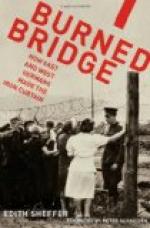“What did I do?” Sophie whispered. “My God, how was I to know what I was doing?”
She sat staring at her father. But she was not seeing him, and Carr knew she did not see him. Some other vision filled those wide-pupiled eyes. Something that she saw or felt sent a shudder through her. Her mouth quivered. And suddenly she gave a little, stifled gasp, and covered her face with her hands.
CHAPTER XXVI
THE LAST BRIDGE
Thompson received his preliminary training in a camp not greatly distant from his birthplace and the suburban Toronto home where the spinster aunts still lived. He did not go to see them at first, for two reasons. Primarily, because he had written them a full and frank account of himself when he got out of the ruck and achieved success in San Francisco. Their reply had breathed an open disappointment, almost hostility, at his departure from the chosen path. They made it clear that in their eyes he was a prodigal son for whom there would never be any fatted calf. Secondly, he did not go because there was seldom anything but short leave for a promising aviator.
Thompson speedily proved himself to belong in that category. There resided in him those peculiar, indefinable qualities imperative for mastery of the air. Under able instruction he got on fast, just as he had got on fast in the Henderson shops. And by the time the first fall snows whitened the ground, he was ready for England and the finishing stages of aerial work antecedent to piloting a fighting plane. He had practically won his official wings.
With his orders to report overseas he received ten days’ final leave. And a sense of duty spurred him to look up the maiden aunts, to brave their displeasure for the sake of knowing how they fared. There was little other use to make of his time. The Pacific Coast was too far away. The only person he cared to see there had no wish to see him, he was bitterly aware. And nearer at hand circumstances had shot him clear out of the orbit of all those he had known as he grew to manhood. Recalling them, he had no more in common with them now than any forthright man of action has in common with narrow visionaries. It was not their fault, he knew. They were creatures of their environment, just as he had been. But he had outgrown all faith in creeds and forms before a quickening sympathy with man, a clearer understanding of human complexities. And as he recalled them his associates had been slaves to creed and form, worshippers of the letter of Christianity while unconsciously they violated the spirit of Christ. Thompson had no wish to renew those old friendships, not even any curiosity about them. So he passed them by and went to see his aunts, who had fed and clothed him, to whom he felt a vague sort of allegiance if no particular affection.
It seemed to Thompson like reliving a very vivid sort of dream to get off a street car at a certain corner, to walk four blocks south and turn into the yard before a small brick cottage with a leafless birch rising out of the tiny grass plot and the bleached vines of sweet peas draping the fence palings.




